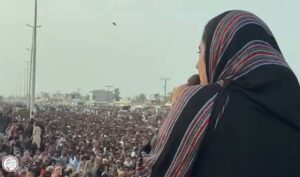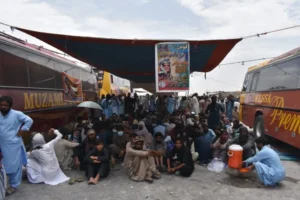Demonstrations have erupted in Pakistan’s Southwestern province, Balochistan, fueled by long standing grievances over human rights violations and the exploitation of the region’s rich resources by the State. The Baloch protests, which had remained largely peaceful, took a violent turn on July 27 when security forces clamped down on Baloch protestors.
Historical Background
Balochistan, Pakistan’s largest and most resource-rich province, has long been a focal point for struggles over justice and sovereignty for decades. The region’s population has consistently voiced grievances over marginalization, human rights abuses, and economic exploitation by the state.
Rich in natural resources like gas, oil, and minerals, Balochistan has seen its wealth extracted with little benefit returning to the local communities, fueling a sense of injustice and disenfranchisement. The people of Balochistan have called for greater transparency in governance, and an end to practices like forced disappearances and extrajudicial killings of the Baloch people.
Strategically, Balochistan is crucial due to its location along the Arabian Sea, home to the country’s only deep-sea port in the city of Gwadar—a key element of the China-Pakistan Economic Corridor (CPEC).

Reasons behind the conflict
- The roots of discontent in Balochistan date back to the early years of Pakistan’s formation. The forced annexation of the independent Baloch state of Kalat in 1948 sowed seeds of resentment among the Baloch people. Since then, the region has witnessed several insurgencies, with the most recent wave beginning in the early 2000s. These insurgencies have been met with heavy-handed military responses, exacerbating the cycle of violence and alienation.
- One of the core issues driving the conflict is the economic exploitation of Balochistan’s resources. Despite being home to a wealth of natural resources, the local population remains impoverished.
- The province’s gas fields, for instance, supply a significant portion of Pakistan’s energy needs, yet many Baloch areas lack basic infrastructure and development. This stark contrast between resource extraction and local poverty has been a central grievance of Baloch nationalist movements.
Human rights abuses further compound the situation. Reports of forced disappearances, extrajudicial killings, and torture by security forces have been a persistent issue.
Human rights organizations have documented numerous cases where activists, journalists, and ordinary citizens have been targeted. The sense of impunity enjoyed by the perpetrators of these abuses has deepened the mistrust between the Baloch people and the state.
The Protests
On Sunday, July 28th, the Baloch Yakjehti Committee organized a “Baloch Rajee Muchi,” or Baloch National Gathering, in Gwadar. However, as convoys from various parts of the large province began heading towards the city, law enforcement officials blocked major highways leading there. This led to clashes in several areas on the preceding day of the Gathering. The BYC alleges that security forces opened fire during one such confrontation in the Mastung district on Saturday, resulting in the death of one person and injuries to several others. Similar incidents have been reported in other cities.

Mahrang Baloch, a prominent figure in the Baloch rights movement, expressed her concerns in a video statement to the media. She criticized the state’s response, stating:
“As you know, we had planned a peaceful rally on July 28, but the state used its full force for two weeks to prevent this peaceful gathering from happening. Almost one thousand of our people have been arrested over the past three days, and we do not know what happened to them.”
Baloch further warned:
“If any members of the Baloch Solidarity Committee are harmed, the state of Pakistan and the provincial government of Balochistan will be held accountable.”
Despite these claims, authorities have denied using force, instead accusing rally participants of attacking security personnel.
Calls for Accountability

The Human rights watchdog, Amnesty International, condemned the government’s actions, accusing authorities of attempting to “vilify and criminalize peaceful protesters.” The organization have urged Pakistani authorities to end their repression of Baloch activists.
“Every time Baloch protests occur, their demands are met with violence by security forces and mass arrests,” reports Amnesty International.
It called for an immediate end to these “punitive crackdowns” and the unconditional release of those detained for peaceful assembly.
The movement has brought to light serious issues like forced disappearances and alleged extrajudicial killings, with activists calling for greater transparency and accountability from the government regarding the whereabouts of their people.
In a recent speech at the Karachi Press Club, Mahrang Baloch highlighted the need for information on missing persons, while Sammi Deen Muhammad, of the Voice for Baloch Missing Persons, demanded news about her father, who has been missing for 15 years.
The Human Rights Commission of Pakistan (HRCP) also criticized the “unnecessary” use of force against the Baloch protests and the suspension of internet and mobile services in the region. The organization recommended forming a high-level parliamentary delegation to engage with representatives of the movement and attentively consider their demands.
As the situation continues to unfold, the Baloch protests in Gwadar, highlight the complex interplay of local grievances and global interests, with the potential to significantly impact Pakistan’s political landscape.
Follow Baloch Yakjheti Committee X for more updates
Follow The Balochistan Post X for more updates
Related Stories:
















